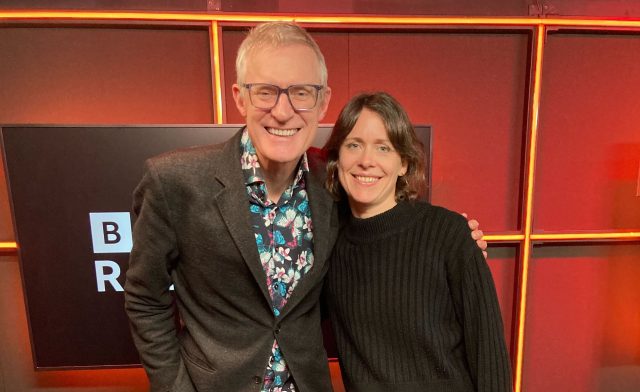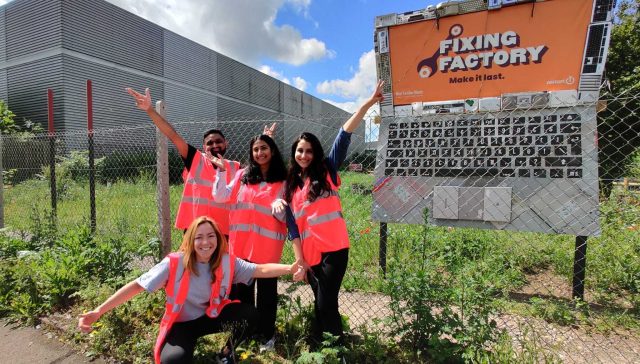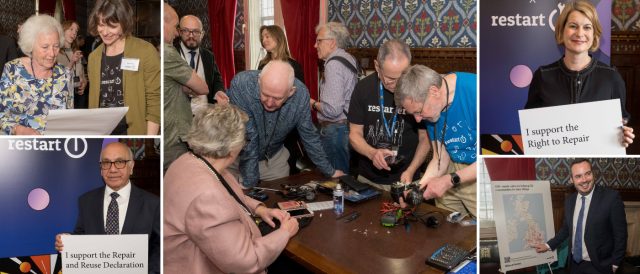Originally published at: https://therestartproject.org/news/our-top-10-moments-from-2024/
This has been another amazing year for Restart and repair in general. We’ve been hard at work—along with our wonderful community—and are incredibly proud of everything we’ve achieved together.
It was hard to pick just ten, but here are our top moments from this year…
10. We sparked a Student Repair Revolution
We teamed up with our friends in the Community Repair Network to bring repair into universities across the UK. Together with staff and students at over a dozen universities, we worked to create more awareness about e-waste, and help young people get hands on with repair, often for the first time.
The resources we produced are now available for anyone who wants to bring repair to their own campus!
9. We got repair in the news
Over the course of this year, we’ve managed to get repair in the news over 50 times on TV, on radio and online!
We’ve worked with media outlets ranging from the BBC to The Guardian, Forbes, The Verge and The Telegraph as well as publications from Italy to India to talk about why repair matters, how people can get involved and why we need a universal Right to Repair enshrined in law.

Our co-director, Fiona, with the BBC’s Jeremy Vine
8. We discovered that only 1 in 5 UK waste facilities offer reuse for electricals
We recycle thousands of working and repairable devices every week in the UK. But fixing or reusing them instead could reduce waste, lower emissions and save households money.
So we investigated what reuse options are currently available at recycling centres and other waste facilities and the challenges of making reuse more widely available.
With the help of our community, we mapped reuse at these waste facilities across the UK and released our data for anyone to see.
We found that most people think electricals that are brought to waste facilities in good condition should be kept in use through repair or reuse. But only a fifth of the UK’s waste facilities offer any reuse of small electrical and electronic devices.
7. We confirmed we still don’t have the Right to Repair for most devices we see
Along with our friends in the Open Repair Alliance, we’ve collectively logged data from more than 200,000 repair attempts across 31 countries. So to celebrate our movement’s 15th birthday, we released a report exploring the rise of the global community repair movement, and what that data tells us.
The story that emerges is one of rapid growth and huge enthusiasm for repair, with an estimated 1,000 repairs happening at community events every day!
But we also found that we have a long way to go to secure our Right to Repair; 96% of the electrical and electronic products seen at community repair events aren’t covered by any Right to Repair legislation here in Europe.
6. We’re expanding our community Fixing Factories to more London high streets
Fixing Factories are permanent spaces on our high streets, which allow people to bring in broken electronics and appliances to be fixed for free, while gaining the skills they need to make repairs themselves in the future.
Earlier this year we were delighted to announce that, along with our partners Possible, we’ll be bringing Fixing Factories to three new high streets in London over the next three years.
The new sites will help more Londoners access dedicated repair spaces, learn repair skills and save money by keeping their existing things in use for longer, while also reducing waste and emissions.

Photo: @Lee_Grant
5. We stewarded the biggest ever International Repair Day
Repair Day continues to grow and this year was no exception.
From 15th birthday celebrations for Repair Café International in the Hague and an open air repair café in the Grand-Place in Brussels to repair training courses for refugees in Uganda, and a talk by the Australian Repair Network in Brisbane. Repair truly was everywhere!
All told, over 2,000 events in more than 40 countries took place during the Repair Day period, smashing last year’s record!
International Repair Day will return on the 18th of October 2025, so put the date in your diary now.
4. We debated directly with an EU Commissioner
Right to Repair Europe, which we co-founded, continues to push the EU to introduce and strengthen pro-repair policies (more on that below). Just before Repair Day, we organised a webinar introduced by one of the most senior figures in the EU at the time, Didier Reynders, European Commissioner for Justice. We shared our data and perspective, highlighting that for the vast majority of products taken to community repair events, there’s no right to repair in sight.
Making our case directly to EU officials represents a step change in the influence of our campaign and we’re excited to build on this momentum going into 2025.
3. One in twenty MPs have signed our Repair & Reuse Declaration
Last year, we launched the UK Repair and Reuse Declaration to resounding support from our UK repair network. This year, we wanted to secure political support. And despite the curveball of a purdah period ahead of the election, we’ve done pretty well!
The declaration now has 46 endorsed political endorsements – that includes 33 sitting MPs (and this number is growing by the week), a couple of councils, and Baroness Hayman who has brought repair to the forefront of multiple debates this year.
If you want to ask your MP to sign up – we’ve made it easy!

Our parliamentary Repair Café. Photos: @Mark_Phillips
2. We brought repair into the heart of government
As we’ve been warning for a while, the UK is falling behind our peers in Europe and North America when it comes to giving everyone access to affordable repair.
So in May we took our case to MPs directly by running a repair café in the Houses of Parliament. Along with representatives from community repair groups across the UK, we spoke to more than 30 MPs about the benefits of fixing the things we already have and the specific policies they could introduce to make repair more accessible to everyone.
We’re hoping to go back next year to follow up and get even more politicians on board!
1. We helped make (some) products easier to repair
It hasn’t been easy, but after years of hard work, our European Right to Repair Campaign helped secure important new EU repair rules.
The result is that from mid-2026, manufacturers will have to provide repair services beyond the warranty period, spare parts should be cheaper and manufacturers will be banned from using software to prevent independent repair across the whole EU. Member states are also invited to introduce financial incentives to make repair more accessible and affordable.
While this new Right to Repair Directive will initially only apply to a limited range of products (such as phones and tablets, washing machines, TVs and fridges), it joins other upcoming EU measures and represents a significant step forward in our ongoing campaign for a universal Right to Repair.
Did you know: thanks to new rules we pushed for, smartphones, laptops and many other consumer electronics sold in the EU will need to have user-replaceable batteries from February 2027!
For more, check out the Campaign’s overview of current and upcoming EU repair rules.
Phew, what a year! And we didn’t even mention our network passing the pretty spectacular milestone of 2,000 tonnes of CO2e and 250 tonnes of waste saved!
Huge thanks go to everybody who has been part of this journey with us, especially our wonderful community and volunteers. We couldn’t do this without you and look forward to seeing what we can achieve together next year!
We’d also like to thank our partners who helped make some of these milestones happen, including our friends in the Open Repair Alliance and Community Repair Network as well as Tiny Studios and Backmarket.
____
If you would like to support our work through a donation, please consider giving what you feel you can. For a limited time, any donation will be doubled by Aviva, and you’ll be doing a huge thing to help us end our throwaway economy. Thank you.